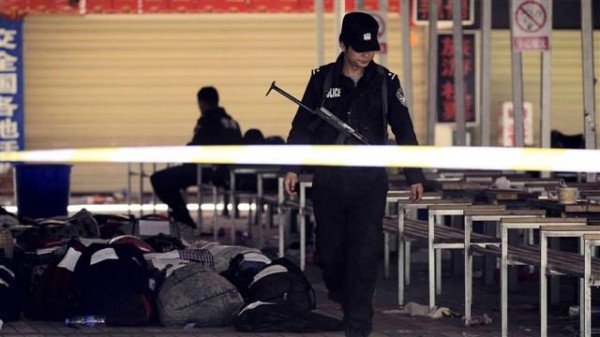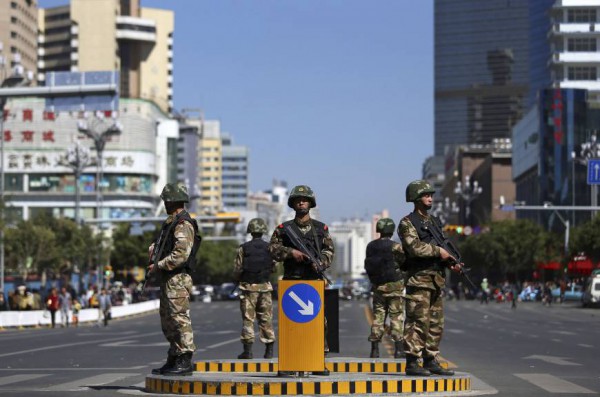Shock and disbelief as 29 are hacked to death at railway station
Editorial statement, chinaworker.info
The massacre at Kunming’s railway station on March 1 –known as the ‘3.1 incident’ – must rank as one of the most shocking acts of terrorism in modern times. The media are calling this “China’s 9/11” and its clear the political impact will be huge. Using long knives and daggers a group of eight black-clad men and women went on a killing spree that lasted half an hour. “They were running and chopping whoever they could,” said a 16-year-old eyewitness. The smell of blood filled the air, according to another. In total, 29 people were killed and a further 143 injured.
Socialists and the chinaworker.info website share the sense of horror and grief felt by the people of Kunming and ordinary working people across China. We oppose the policies and repressive methods of the Chinese dictatorship – most evident in the state terror used against national minorities such as the Uighurs and Tibetans. But we are also opposed to the disastrous methods of religious and political terrorism. Far from hastening the collapse of a tyrannical state these methods ultimately reinforce it, by dividing the oppressed and further complicating the task of building united and organised mass resistance.
Official statements say ‘Xinjiang separatists’ were behind the attack, pointing to the Uighur Muslim minority from the vast and nominally ‘autonomous’ northwestern region of Xinjiang. Kunming, the provincial capital of ethnically diverse Yunnan, home to 25 ethnic and linguistic groups, is a long way from Xinjiang. The city is a popular tourist destination and a melting pot of ethnic minorities who generally enjoy good relations. There is disbelief and anger therefore that the city was singled out for this attack, ostensibly against the policies and practices of the Chinese regime. “How could they attack the common people? What have we done?” the wife of one of the injured told the Wall Street Journal’s reporter in Kunming.

‘Strongman’ Xi
The Kunming attack was timed to coincide with the start of the annual ‘twin meetings’ of the dictatorship’s rubber-stamp parliament, the NPC, and its advisory chamber, the CPPCC, which open this week. This follows a similar pattern to the suicide attack in Beijing’s Tiananmen Square last October, on the eve of the ruling ‘Communist’ Party’s Central Committee Third Plenum meeting.
The implications of this bloody event could be very far reaching for China as a whole and not least for the oppressed Uighur minority, which could face a violent backlash. The regime of Xi Jinping, whose first year in power has been marked by greater state repression and centralisation of power, is clearly shaken by the audacity and ferocity of this attack, more so even than the Tiananmen attack of five months ago. Xi is under pressure – in order to support his ‘strongman’ image – to demonstrate a tough response as encapsulated by his pledge to “resolutely crack down on those who have been swollen with arrogance.” The ‘3.1 incident’ will therefore be used to concentrate greater powers in Xi’s hands and in the new National Security Commission, launched at the Third Plenum to help the regime prepare for war and revolution.
A further militarisation of Xinjiang, Tibet and other ethnic minority regions can be expected. This is already indicated by a large presence of police and SWAT teams reported in Dashuying, a poor neighbourhood of Kunming which is home to a large Uighur population. Just as the biggest losers from the ‘9/11’ attacks on New York and Washington in 2001 were the poor of the Muslim world who have suffered multiple US and Western-backed military invasions, wars and civil wars, the biggest losers from the ‘3.1’ attack are likely to be the long suffering Uighur people. As a storm of comments on social media suggests, the massacre can trigger a racist backlash against Uighurs, which at least in the short-term will make it easier – in political terms – for the regime to step up its iron fist policies in Xinjiang.
“The psychological impact of this on the Chinese general public will be enormous,” said Shan Wei, a political scientist based in Singapore. “It gives the Chinese government a very strong reason to step up its hardline policies on the Xinjiang or Uighur issue,” he said.
As chinaworker.info warned at the time of the Tiananmen attack the state’s use of repression in pursuit of ‘stability’ in minority areas has produced the opposite result. Following the 2009 Han-Uighur ethnic clashes, which claimed around 200 lives in Xinjiang’s capital Urumqi, the Chinese regime has enormously stepped up its military presence in the region. In the past two years the state’s tactics have focused on house-to-house raids even in remote communities, which have further alienated the Uighur population. Since April last year 100 people have been killed in clashes in the province.
The Kunming attack is an ominous warning of where this spiral of violence can lead. It represents the first time such large-scale violence has spilled over into another part of China. “It is without question an escalation,” Swedish counter-terrorism expert Magnus Ranstorp told The Guardian newspaper.
Market economics, more dictatorship
The Chinese dictatorship’s policies towards national minorities have created a powder keg. The regime is haunted by the break-up of the Soviet Union in 1991 and the role of national conflicts in this process. These fears will have been revived by the recent military showdown between Russia and Ukraine over Crimea. Xi Jinping especially has made no secret of his view that the partial democratic reforms of former Soviet leader Mikhail Gorbachev were a catastrophic error that caused the Soviet state to collapse.
The Chinese regime’s ‘solution’ is to bolster dictatorial rule – shown by the recent trials of leading activists from the anti-corruption New Citizens’ Movement – combined with a policy of ‘GDP-ism’ to placate the national minorities. Xinjiang was one of the fastest growing regions of China with 11.1 percent GDP growth in 2013, outstripping the national rate of 7.7 percent. The problem is the poor – of all nationalities but especially minorities – do not benefit from the current capitalist model of GDP growth. In Xinjiang, Uighurs hold just 13 percent of the high-income jobs, while they account for 46 percent of the population. Discrimination in the labour market, housing and education, add to grievances over lost linguistic rights and tighter controls on religion.
The arrest and impending trial of Beijing-based Uighur economics professor, Ilham Tothi, lays bare the contradictions of the government’s position. Tothi is a moderate who does not oppose Chinese rule in Xinjiang, but has voiced criticism of its language and cultural policies. He now faces a stiff prison sentence for ‘inciting separatism’. What signals does this send to the youth and the national minorities especially, when all dissent is labelled as treason?
Through its increasingly hardline position the Chinese regime is preparing social convulsions. Socialists stand for united working class struggle against state repression, against racism, and against all forms of persecution whether on religious, political or ethnic lines. We stand for full and immediate democratic rights, including the right to genuine autonomy or independence for the national minorities if this is their democratic choice. This must be linked to a struggle against the dictatorship’s capitalist agenda, which has created one of the biggest wealth gaps in the world and threatens major economic shocks in the period ahead.





